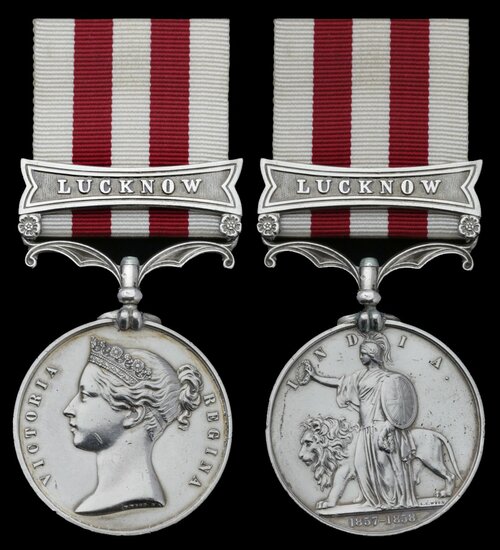
Auction: 22001 - Orders, Decorations and Medals
Lot: 30
A fine Indian Mutiny Medal to Colonel W. Keith, Royal Engineers, twice mentioned in dispatches for his gallant services at Lucknow
Indian Mutiny 1857-59, 1 clasp, Lucknow (Lieut. W. Keith, Royal Engrs.), very fine
M.I.D. London Gazettes 16 April 1858 & 17 July 1858.
William Keith was born at 25 Union Street, Aberdeen on 5 October 1836, the son of another William Keith. Gaining a Lieutenancy in the Royal Engineers on 7 April 1856, he was assigned to No. 4 Company, led by Major L. Nicholson. This company landed at Calcutta on 21 November 1857, and together with No. 11 Company, it was to form the Engineer Brigade before Lucknow, under the command of Brigadier-General Robert Napier, Bengal Engineers. Keith took part in Sir Colin Campbell's final recapture of Lucknow in March 1858.
Major-General Sir James Outram outlined every stage of this operation in his subsequent dispatch, from which we know that Major Nicholson ordered two 'cask bridges' to be thrown across the River Goomtie on the night of 4 March. Though it was a 'troublesome and difficult operation', the bridges and their approaches were complete by 4 a.m. on the 5th, enabling three troops of artillery, five regiments of cavalry, and two infantry brigades to continue the advance on Lucknow.
On the night of 8 March, having reached the city, the Engineer Brigade was ordered to construct an entrenchment for eight 24-pounder siege guns and three 8-inch howitzers. Accurate fire from this battery enabled Campbell's force to occupy the Fyzabad Road, giving it complete control over Lucknow's eastern suburbs. When a rebel stronghold called the Padshah Bagh was reached, men of the Royal Engineers blew open its gates with powder charges. Under murderous enemy fire, they selected the best site for siege guns to enfilade the mutineers at La Martiniere. Major Nicholson wrote in his diary:
'Got close to the enemy's lines, and from a position close to the [River] Kukrail we found we could see into the rear of these works. Poor creatures! They have not a grain of sense; they have thrown up the most tremendous works, and they are absolutely useless.'
Keith and his comrades spent the night of 9 March digging a battery for five mortars next to the Padshah Bagh. As 10 March dawned, these mortars commenced a fearful bombardment of the Kaiser Bagh, which fell on 14 March. On 17 March, after the Residency had been recaptured, the Engineer Brigade was ordered to destroy nine cart loads of powder at the Juma Musjit. By some accident, the powder ignited prematurely. Captain Clarke and Lieutenant Brownlow, along with 30 men, perished in the explosion. Outram wrote that every man present sustained at least some injury, but it is not known whether Keith was among them. Mentioned in Outram's dispatch, Keith was 'highly applauded' by Major Nicholson for 'energy displayed' before Lucknow.
Keith was present at Jhansi on 3 April, when the city's formidable walls were stormed by Sir Hugh Rose's troops. He then commanded the detachment of No. 4 Company, Royal Engineers that formed part of the Azimgurgh Field Force, under Brigadier-General Sir E. Lugard. Azimgurgh lay 170 miles east of Lucknow, and posed a threat to Campbell's lines of communication to Calcutta. The city was held by some 300 rebel sepoys of the 7th, 8th, and 40th Bengal Native Infantry. Lugard's force arrived before Azimgurgh on 15 April, finding that the main bridge over the River Tons had been partially destroyed. Keith, leading a party of Sikh sappers, quickly repaired the bridge in full view of the enemy. This enabled three guns of the Royal Horse Artillery to reach the far bank, commencing a brisk fire against the mutineers. This action earned Keith the 'warmest thanks' of Brigadier-General Lugard.
Promoted to Captain on 5 June 1865, Keith was stationed in Nova Scotia for five years, before a lengthy posting to Gibraltar in 1881. He became a Colonel in the Royal Engineers on 1 July 1885, and retired from the Army on 17 December 1887, having served for 30 years and 286 days. He was awarded an extra annuity, bringing his total retirement pay to £598 per annum. His brother, George Keith, was a Colonel on the Madras Staff Corps.
Sold with copied research, London Gazette entries, and a long extract from Lieutenant-Colonel Sandes' memoir The Military Engineer in India.
Subject to 20% VAT on Buyer’s Premium. For more information please view Terms and Conditions for Buyers.
Sold for
£1,200
Starting price
£450




